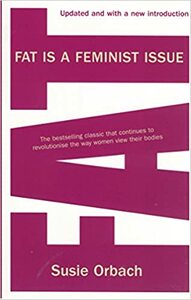Take a photo of a barcode or cover
challenging
informative
inspiring
medium-paced
The book explains the state of fatness as a response to patriarchal or gender based socialization. It tries to be sensitive in its cure for obesity but it lacks awareness towards its goal of making women look thin. The book was written with the goal of Keeping women thin. It is also a book for white/ Caucasian women - may not be relevant to other races. While the book claims to address eating disorders, it largely focuses on emotional overeating.
Graphic: Addiction, Body shaming, Chronic illness, Eating disorder, Fatphobia, Mental illness, Dysphoria, Classism
challenging
informative
reflective
medium-paced
It is quite dated especially with it's discussions of anorexia especially as it only seems to focus on women and ignore men have it too but for a feminist book from the 70s what did I expect
An interesting piece of feminist history, sadly steeped in fatphobia
Some thirty years old but still relevent today. I felt the cover was somewhat misleading because it's not really a weight loss book but a book about the relationship of women and food, the expectations of society, and a woman's role as mother. Says something about how little society has changed in certain areas as I related to it even though we have supposedly come a long way since the seventies. Some things she addresses have changed a bit, but the contradictary pressures on women to be nurturing mothers, sexual beings and viriginal all at the same time still apply. Maybe this should be re-read in the light of "the obesity epidemic". And yes I think some aspects of it can be applied to men.
it's amazing to think this book was originally published 40 years ago, when the conversation on body variance and body positivity was so, so far from non-existent. considering this, FIFI is a remarkable piece for its time. I read the updated version which delved more into practical aspects that Orbach lays out related to eating and hunger, but I was upset that this reissue did not consider more cultural perspectives on eating and the body, instead of still only focusing on gender. in addition, gender in this book reflects a binary way of thinking, and considering how much the concept of gender has changed since its first publication, it would have been helpful to consider how eating impacts those who identify as non-binary, trans, GNC.
DNF. I thought this would be a book on positivity... I mean, if body positivity means "come on tubs! You're just fat for protection. You're fat because you're scared of being thin, there's a beautiful skinny woman inside of you, you just have to be comfy enough to let her out! " I uh, guess this book does body positivity? (/s) I made it about halfway through, skimming most of it because I was constantly looking for the next wtf to show my partner the audacity of this book. The back of the book says that The New York Daily News says "Throw Out Your Diet Books..." I'm going to consider this a diet book, one which I felt barely touched on any feminism other than white middle class feminism, an odd form of feminism for those who don't want to give up their fav parts of the patriarchy (like come on, who doesn't want to be skinny and better than the fat girls). I can't with this book, it shows it's age, and I think I'd rather find more modern takes on body positivity than this.
Interresting book. I wouldn’t recommend it as a good book about diet or food addiction, but as a good source of feminist thought from the ‘70. I think it should be read as a piece of history of the womens movement. Some things described still ring true, but it is mostely outdated and (I feel) unhelpful.
challenging
informative
reflective
medium-paced
challenging
hopeful
informative
inspiring
reflective
medium-paced



